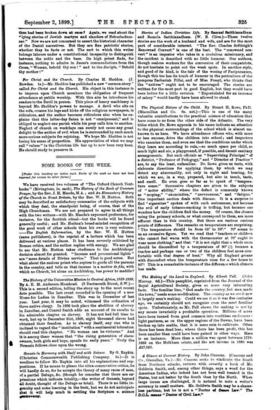The Physical Nature of the Child. By Stuart H. Rowe,
PhD. (Macmillan and Co. 6s. net.)—This is one of the many valuable contributions to the practical science of education that have come to us from the other side of the Atlantic. The very titles which Dr. Rowe appends to his name indicate an attention to the physical surroundings of the school which is almost un- known to us here. We have attendance officers who, with more or less success, drive the children into school ; and inspectors who examine them, and even see that the conditions under which they learn are according to rule,--so much space per child, so much light and air, a playground, if possible, and decent sanitary arrangements. But such officials as "Supervising Principal" of a district, "Professor of Pedagogy," and "Director of Practice" are, to say the least, unfamiliar. Dr. Rowe gives us tests, with elaborate directions for applying them, by which we may detect any abnormality, not only in sight and hearing, for which we are, in a way, prepared, but also in touch, taste, and smell. He even goes so far as to speak of "tempera- tore sense." Successive chapters are given to the subjects of " motor ability," where the defect is commonly known as "moping," "enunciation," "nervousness," and "fatigue." One important section deals with disease. It is a surprise to find " eigarettes" spoken of with such seriousness, not because the evil of early tobacco-smoking is trifling, but because one wonders how the children find the money. Of course, the classes using the primary schools, or what correspond to them, are more affluent than in this country. But there are various curious points of difference. The remarks on temperature are surprising. "The temperature should be from 65° to 70°." 70° seems to us an excessive figure. Yet we read that "teachers or children who cannot feel warm with the thermometer at 70° ought to wear more clothing," and that "it is not right that a whole room should be discomfited by a temperature of 80° (!) because a teacher and perhaps one or two of the children feel more com- fortable with that degree of heat." Why all England groans with discomfort when the temperature rises for a few hours to 80'! This is a remarkable instance of the difference which climate has made.


































 Previous page
Previous page